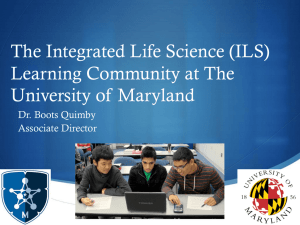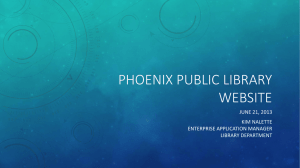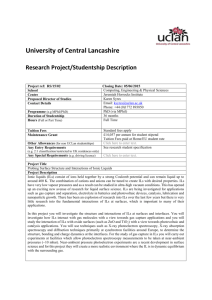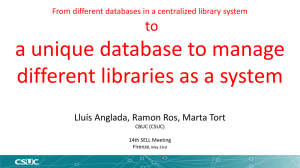Assessing the Impact of the Interactive Learning Space Initiative on Faculty
advertisement
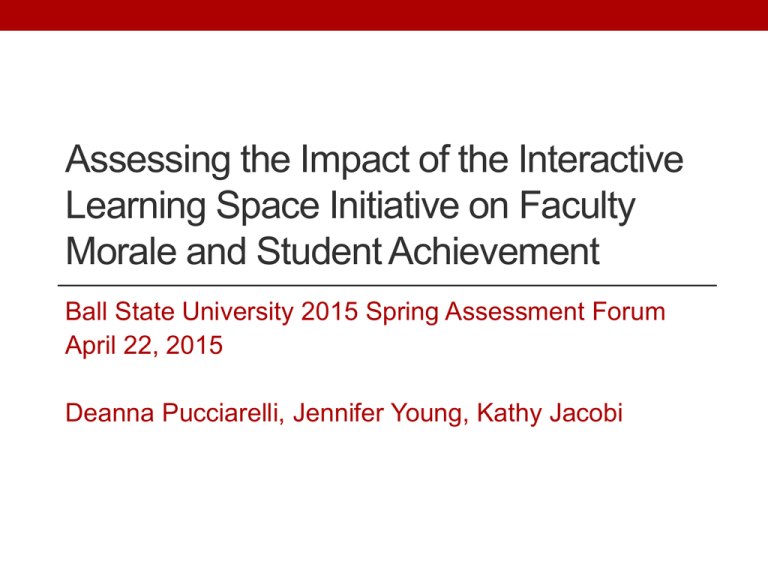
Assessing the Impact of the Interactive Learning Space Initiative on Faculty Morale and Student Achievement Ball State University 2015 Spring Assessment Forum April 22, 2015 Deanna Pucciarelli, Jennifer Young, Kathy Jacobi PURPOSE – to strengthen learning through pedagogy, space, and technology • PEDAGOGY – move from lecture-based to active learning • SPACE – physical and virtual space to support active learning • TECHNOLOGY & FURNISHINGS – supports interaction and active engagement with content Learning Spaces TC 412 Node Classroom 24 node chairs, 3 interactive white boards, document camera, Apple TV, huddle boards, small breakout space TC 414 Media:scape Classroom 4 media:scape tables, 1 interactive white board, Apple TV, document camera, huddle boards Tenets of the ILS Faculty Development Program Inter-program & Inter-cohort Research Collaboration • Faculty within same department, but different disciplines • Faculty with experience in ILS (cohort I and cohort II) • ILS Administrator (Jacobi) constant Mixed-Method Design • Quantitative • Faculty Survey – collaboration on course redesign and research during ILS participation • Course Evaluation Scores – students’ perception of content delivery • Qualitative • Focus Groups – impact on faculty morale and productivity Demographics (n=28) 23 cohort 1 (15) 19 cohort 2 (13) 68% participation Faculty Post Secondary Years of Teaching n=27 1-5 6-10 11% 11% 26% 11-15 16-20 21-25 25+ 11% 19% 22% 54% Female 46% Male 5 Colleges 19 Departments Faculty i-Clicker Questions • Did you redesign your course syllabus as a result of collaboration? • Did you redesign your course activities as a result of collaboration? • Did you redesign your course delivery as a result of collaboration? • Did you engage in research projects? • Did you collaborate on those research projects? Student Course Evaluation Questions • My instructor uses effective examples and illustrations • This course broadens my perspective and/or knowledge Focus Group Methods • Audio recorded and transcribed • Independently coded by 3 researchers • Identified prominent themes Focus Group Questions • How has participation in the ILS impacted you? • Has the ILS Initiative impacted your morale? How? • Of the various faculty development activities embedded in the ILS Initiative, which did you find most impactful? Focus Group Questions • Describe how you collaborated with others during the ILS Initiative. • Can you share if your productivity has changed as a result of collaborating with faculty across campus? • Reflecting on your overall experiences with the ILS Initiative, how has your ‘professional’ sense of purpose been affected? Faculty i-clicker Findings • 78% redesigned course • 89% redesigned course activities • 94% redesigned course delivery • 50% engaged in research/scholarship Student Course Evaluation Methods and Findings • Two-Way Repeated Measures MANOVA and Two-Way Repeated Measures ANOVA • No significant difference (pre-post responses) Focus Group Findings “ . . . it did make me a better teacher, and it made me a better teacher in a traditional classroom.” “The collaboration with others, just being in conversation with others was such an important part of this experience.” “The collaboration was a big, big thing for me. . . it’s nice to get to know people outside your department and share an interest in teaching.” “(Participation in the ILS Initiative has) made me a more well-rounded person.” Focus Group – Findings “. . . I have become set in my ways. . . But this was a whole turning over the apple cart and doing everything new. It’s been rejuvenating or reinvigorating in that sense.” “ . . . the impact is has on me was kind of life-changing . . . there was a huge impact on the class, but it was also kind of a life-changing thing for me in my professional role.” “(My professional sense of purpose is) Off the charts.” “I think (participating in the ILS) gave me a second life. . . this (is) probably part of the reason I’m still here.” Focus Group Themes Inputs Facilitating Factors Outputs Outcomes What resources were provided? What helped faculty achieve outputs? What was produced as a result of inputs and facilitating factors? What impactful changes have occurred as a result of this process? Technology • Multiple projection screens • Eno boards • Huddle boards • Apple TV Physical space • Node chairs • Media:scape Pedagogical resources • Books • Journal articles • Research data • Theory • Opportunities to collaborate with faculty • Support from the Office of Educational Excellence, faculty, mentors • Opportunities to explore, experiment with teaching • Participation in Faculty Development Week • Experiencing faculty research presentations • Ability to engage in risk taking • Receiving weekly emails • Flipped classroom instruction • Research productivity • Presentations • Posters • Spillover/crossover to other classes • Traditional space • Online • Increased student engagement • Accelerated use of new tool/technology • Improved interaction with students • Impactful classroom redesign • Formation of writing groups • • • • • Increased morale Feeling hopeful Open to new ideas Sense of empowerment Rejuvenation, reenergized • Enhanced sense of purpose • Connection to campus community Focus Group Themes Environment Content Engagement Interaction Instructor Student Conclusions • Evidence of improved faculty morale. • Evidence of increased collaboration among faculty members. • Evidence of the ILS Initiative influencing teaching in ILS and traditional classrooms. • Evidence of increase in research productivity for some. Outcomes and Future Research • Dissemination of Findings: Faculty conference presentations; Manuscript in-progress • Continue study to collect data from Cohorts 3 & 4 to build university database • Continued data collection of course evaluation scores to see if differences are revealed with larger sample size. • Pucciarelli and Young teaching in BB109, F2015 BB109 (opening F2015)
